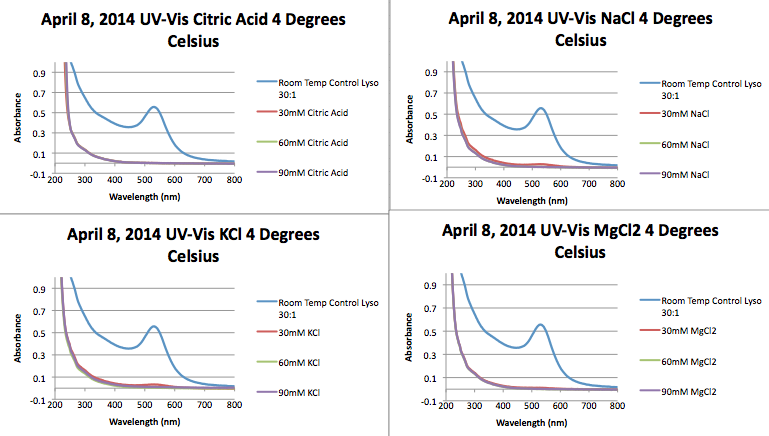Entry title
Objective
- Take conductivity measurements on room temperature solutions from 3/26/14.
- Run UV-Vis and AA on solutions at 4°C from 3/26/14.
Procedure
Conductivity Measurement of Pure Variables at Room Temperature

Atomic Absorption Preparation
Creating the Gold Stock Solutions
- Add 50 μL of HAuCl4·3H2O and 4950 μL of distilled water to a Falcon tube, for a final concentration of 10 μg/mL Au.
- Add 100 μL of HAuCl4·3H2O and 4900 μL of distilled water to a Falcon tube, for a final concentration of 20 μg/mL Au.
- Add 150 μL of HAuCl4·3H2O and 4850 μL of distilled water to a Falcon tube, for a final concentration of 30 μg/mL Au.
- Add 200 μL of HAuCl4·3H2O and 4800 μL of distilled water to a Falcon tube, for a final concentration of 40 μg/mL Au.
- Add 250 μL of HAuCl4·3H2O and 4750 μL of distilled water to a Falcon tube, for a final concentration of 50 μg/mL Au.
Atomic Absorption Samples
Solutions with the following Au:lysozyme ratio at 4°C were run on the AA:
- 30:1 lysozyme-AuNP with 0.03 M MgCl2, CaCl2, NaCl, KCl, MES, citric acid (0.0002316 M 2,2 bipyridine)
- 30:1 lysozyme-AuNP with 0.06 M MgCl2, CaCl2, NaCl, KCl, MES, citric acid (0.0004544 M 2,2 bipyridine)
- 30:1 lysozyme-AuNP with 0.09 M MgCl2, CaCl2, NaCl, KCl, MES, citric acid (0.0006772 M 2,2 bipyridine)
Figures
Atomic Absorption


UV-Vis
- The following UV-Vis are for 30:1 lysozyme-AuNP samples made on March 26, 2014. The samples were synthesized using the method we've been using all year and variables were added added synthesis. The samples were then cooled to 4°C to see the effect on fiber formation.
- Note that all for all samples with the exception of the 2,2 bipyridine samples caused almost all AuNPs to fall out of solution.



- Note that due to the measure of accuracy of the equipment used, the percentages that are close in value might not different enough to be considered significant. This is because the values used to calculate these percentages differed by one decimal point ex: .0005 and .0004

|






